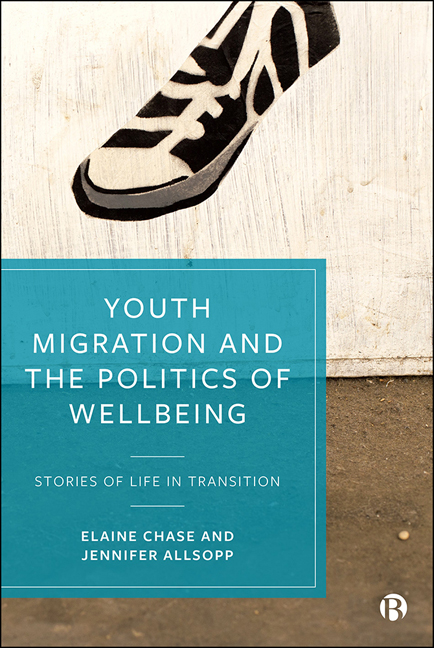Book contents
- Frontmatter
- Contents
- List of Figures
- Acknowledgements
- Foreword
- ‘Future’
- 1 Introduction
- 2 Conceptualizing Wellbeing in the Context of Migration and Youth Transitions
- 3 Capturing Wellbeing in Transition: An Alternative Approach
- 4 ‘Iron Rod’ or ‘Colander’? Welfare Regimes in England and Italy
- 5 The Pursuit of Safety and Freedom
- 6 Legal Integrity and Recognition
- 7 Identity and Belonging
- 8 Constructing Viable Futures as ‘Adults’
- 9 Emotional and Mental Wellbeing
- 10 Friendships, Connections and Relationships
- 11 Transnational Family and Connections
- 12 Conclusion
- Endnotes
- References
- Index
8 - Constructing Viable Futures as ‘Adults’
Published online by Cambridge University Press: 21 April 2021
- Frontmatter
- Contents
- List of Figures
- Acknowledgements
- Foreword
- ‘Future’
- 1 Introduction
- 2 Conceptualizing Wellbeing in the Context of Migration and Youth Transitions
- 3 Capturing Wellbeing in Transition: An Alternative Approach
- 4 ‘Iron Rod’ or ‘Colander’? Welfare Regimes in England and Italy
- 5 The Pursuit of Safety and Freedom
- 6 Legal Integrity and Recognition
- 7 Identity and Belonging
- 8 Constructing Viable Futures as ‘Adults’
- 9 Emotional and Mental Wellbeing
- 10 Friendships, Connections and Relationships
- 11 Transnational Family and Connections
- 12 Conclusion
- Endnotes
- References
- Index
Summary
‘Because with everything that happened, I know I can write my life, which way shall I go. I can go the road that I want. Before now, everywhere was junction and block, sealed off and I can't jump.’ (Janan, in the UK)
Introduction
This chapter considers the opportunities and constraints encountered by young people in the study as they sought to realize the sorts of futures they aspired to. As such, it brings to light the bordered realities of their becoming. While many young people arriving in England, and to some extent in Italy, alluded to the expanding futures emerging in Europe, they frequently saw these new horizons shrinking as they approached adulthood, particularly if they still had uncertain legal status. At the juncture between institutionally defined childhood and adulthood, the notion of vulnerability, used by immigration and social care structures and systems as a sorting mechanism for deciding who is and is not eligible to support, takes on very different economic, social and political meanings. No longer meeting the institutional criteria of the ‘vulnerable child’, young people may paradoxically become more vulnerable as they encounter the multiple uncertainties of having an undetermined immigration status or, even when they do have status, are propelled towards independence with little preparation or support. Refocusing the lens away from individualized factors and circumstances typically associated with vulnerability towards more fundamental questions of the precarity – or the ‘politically-induced’ nature of precariousness (Butler 2006, 2009), we argue, forces a reconsideration of policies and practices and how they fundamentally determine young people's wellbeing outcomes, and whether or not they can construct the sorts of futures they aspire to.
Viable futures through becoming adult
Young people in the research commonly saw their personal priorities for moving forwards with their lives as a set of intersecting motives including finding safety, securing work, pursuing their education, family reunification and the right to a private life. Such pursuits were linked to achieving a degree of autonomy and greater responsibility which they associated with ‘becoming adult’.
In Europe and North America, much research on transitions to adulthood has examined the trajectories of ‘disadvantaged youth’, especially men, in urban areas (McDowell 2001; Thomson et al 2002).
- Type
- Chapter
- Information
- Youth Migration and the Politics of WellbeingStories of Life in Transition, pp. 135 - 152Publisher: Bristol University PressPrint publication year: 2020



